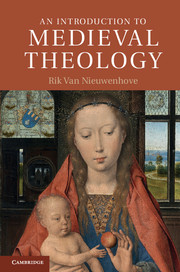Book contents
- Frontmatter
- Contents
- Abbreviations
- Chapter 1 Introduction
- Part I The legacy of the Fathers
- Chapter 2 Augustine of Hippo
- Chapter 3 Monks and scholars in the fifth and sixth centuries
- Part II Early medieval theologians
- Part III The eleventh and twelfth centuries
- Part IV The thirteenth century
- Part V The fourteenth century and beyond
- Bibliography
- Index
- References
Chapter 3 - Monks and scholars in the fifth and sixth centuries
John Cassian, Boethius and Pseudo-Dionysius
Published online by Cambridge University Press: 05 June 2012
- Frontmatter
- Contents
- Abbreviations
- Chapter 1 Introduction
- Part I The legacy of the Fathers
- Chapter 2 Augustine of Hippo
- Chapter 3 Monks and scholars in the fifth and sixth centuries
- Part II Early medieval theologians
- Part III The eleventh and twelfth centuries
- Part IV The thirteenth century
- Part V The fourteenth century and beyond
- Bibliography
- Index
- References
Summary
John Cassian and Latin monasticism
Christian monasticism finds its origins in the Egyptian desert. Following the example of St. Anthony (d. 356) who, inspired by Matthew 19:21, sold everything and lived the life of a hermit, men and women set up monastic cells in the Nile region. Monasticism took different forms. Some monks favored the anchorite or eremitic life; others adopted a more communal monastic life, called cenobitic (Pachomius). The monastic movement spread to Palestine and Syria. After he left Rome, Jerome (d. 420) espoused the life of a hermit near Bethlehem, and spent years translating the Bible from Hebrew and Greek into Latin (the Vulgate).
John Cassian (d. 430) founded monasteries in Gaul (more specifically: near Marseilles). His writings form one of the most important links between Egyptian monasticism and the Latin West. He visited the Desert Fathers in Egypt, and adapted their way of life for his own monasteries. From here, these ideals spread through the rest of Gaul and abroad, as far as Ireland, from which, in time, missionaries would be sent out to Scotland and northern England (Columba), and mainland Europe (Columbanus (d. 615), with monastic settlements in Luxeuil in Burgundy and Bobbio in Northern Italy) to assist in the re-christianization of Western Europe. John Cassian wrote two influential works for his communities: The Institutes and The Conferences (Collationes). The Institutes deal with a wide range of ascetical issues, ranging from the garb of monks to ways of praying; but its main topic is the eight principal vices (gluttony, fornication, avarice, anger, sadness, acedia, vainglory and pride). The Conferences is the more voluminous work. As the title suggests, it consists of gatherings of Egyptian monks, or “Abbas” (Fathers) who discuss topics such as prayer, renunciation, vices, repentance, the role of discretion (a virtue which assists in distinguishing between good and bad), submission to elders, friendship and contemplation. The goal of the entire ascetical practice is purity of heart, so as to reach the kingdom of heaven.
- Type
- Chapter
- Information
- An Introduction to Medieval Theology , pp. 27 - 36Publisher: Cambridge University PressPrint publication year: 2012



